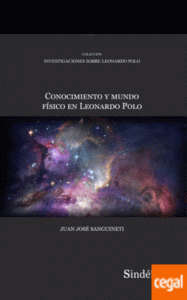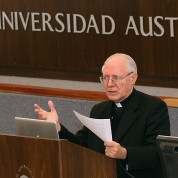 In 2020, Dr. Juan José Sanguineti published the book “Conocimiento y mundo físico en Leonardo Polo” [Knowledge and the physical world in Leonardo Polo]. This book presents in its unit the philosophy of knowledge and of cosmos of Leonardo Polo. Starting from the limit of our thought, it investigates its prolongation in the sciences and the repeated attempt to overcome it in philosophy. The sciences reduce natural things to intelligible (mathematized) objects that give a certain idea of reality and are especially useful for the technological domain of the world. Natural philosophy –causal physics in Polo– attempts the difficult task of immersing itself in a world without current intelligibility, renouncing its objective possession, to make its causes explicit in their complete cosmic context. Polo’s proposal continues in some way the Aristotelian project of Physics, de-objectifying it. For this, it is necessary to change your mentality, if you want to understand the material world as it is and not as we elaborate it with conceptual thought. In this book, a dark universe is outlined for us, in its continuous alternation between processes and formal arrests. It is a universe sustained by a perennial cosmic pulsar that, at its high levels, like life, lights up and orders progressively, without ever reaching a definitive culmination. Only in this way is it possible to get rid of all premature metaphysics and take the leap beyond the limit that allows us to glimpse the cosmic being as a perennial beginning that persists and thus reveals its created condition. The reader who is encouraged to read this, if he does not previously know Polo, may feel surprised at the novelty of his proposal. But he may also allow himself to be captured by it and perhaps he will be motivated to try to better understand the secret of the universe, beyond what ordinary knowledge and scientific explanations present.
In 2020, Dr. Juan José Sanguineti published the book “Conocimiento y mundo físico en Leonardo Polo” [Knowledge and the physical world in Leonardo Polo]. This book presents in its unit the philosophy of knowledge and of cosmos of Leonardo Polo. Starting from the limit of our thought, it investigates its prolongation in the sciences and the repeated attempt to overcome it in philosophy. The sciences reduce natural things to intelligible (mathematized) objects that give a certain idea of reality and are especially useful for the technological domain of the world. Natural philosophy –causal physics in Polo– attempts the difficult task of immersing itself in a world without current intelligibility, renouncing its objective possession, to make its causes explicit in their complete cosmic context. Polo’s proposal continues in some way the Aristotelian project of Physics, de-objectifying it. For this, it is necessary to change your mentality, if you want to understand the material world as it is and not as we elaborate it with conceptual thought. In this book, a dark universe is outlined for us, in its continuous alternation between processes and formal arrests. It is a universe sustained by a perennial cosmic pulsar that, at its high levels, like life, lights up and orders progressively, without ever reaching a definitive culmination. Only in this way is it possible to get rid of all premature metaphysics and take the leap beyond the limit that allows us to glimpse the cosmic being as a perennial beginning that persists and thus reveals its created condition. The reader who is encouraged to read this, if he does not previously know Polo, may feel surprised at the novelty of his proposal. But he may also allow himself to be captured by it and perhaps he will be motivated to try to better understand the secret of the universe, beyond what ordinary knowledge and scientific explanations present.
 Juan José Sanguineti, Research Fellow of the Institute, has a PhD in Philosophy (Universidad de Navarra, Spain). He was Professor of Philosophy of Knowledge at the School of Philosophy at the Pontifical University of the Holy Cross (Rome). He has published fifteen books and nearly a hundred scientific articles on theory of knowledge, philosophy of science, philosophy of nature, philosophy of mind and the neurosciences. He was Director of the Scientific Committee of the Project STOQ III (Rome, 2007-2010, University of the Holy Cross, area of Neurosciences). He regularly delivers graduate courses and seminars at different universities in Latin America. He is ordinary member of the Pontifical Roman Academy of Saint Thomas and of the Sociedad Tomista Argentina. He is a member of the scientific committee of the journal Acta Philosophica (University of the Holy Cross).
Juan José Sanguineti, Research Fellow of the Institute, has a PhD in Philosophy (Universidad de Navarra, Spain). He was Professor of Philosophy of Knowledge at the School of Philosophy at the Pontifical University of the Holy Cross (Rome). He has published fifteen books and nearly a hundred scientific articles on theory of knowledge, philosophy of science, philosophy of nature, philosophy of mind and the neurosciences. He was Director of the Scientific Committee of the Project STOQ III (Rome, 2007-2010, University of the Holy Cross, area of Neurosciences). He regularly delivers graduate courses and seminars at different universities in Latin America. He is ordinary member of the Pontifical Roman Academy of Saint Thomas and of the Sociedad Tomista Argentina. He is a member of the scientific committee of the journal Acta Philosophica (University of the Holy Cross).
The book is available here.

